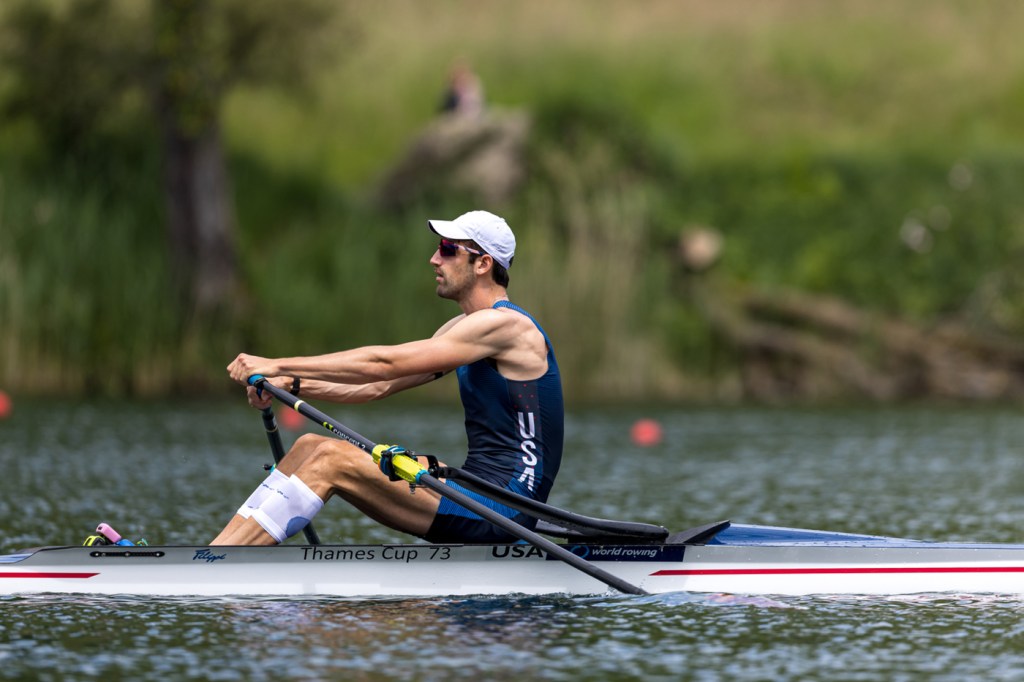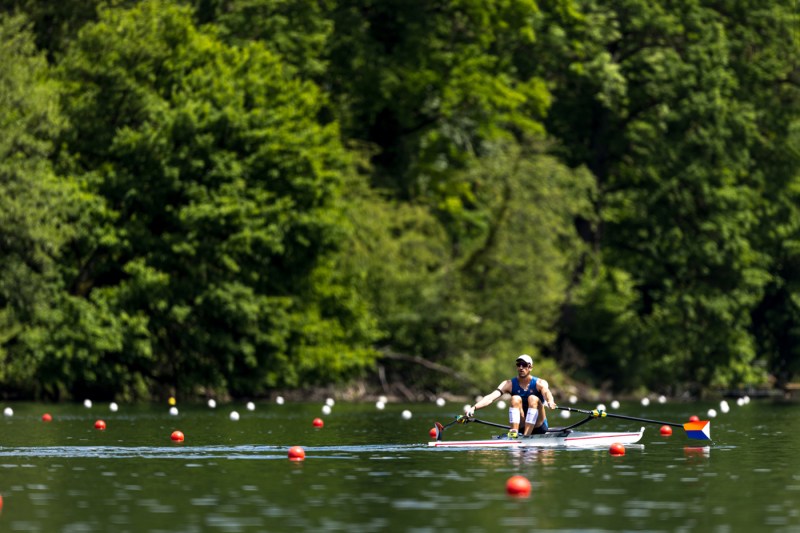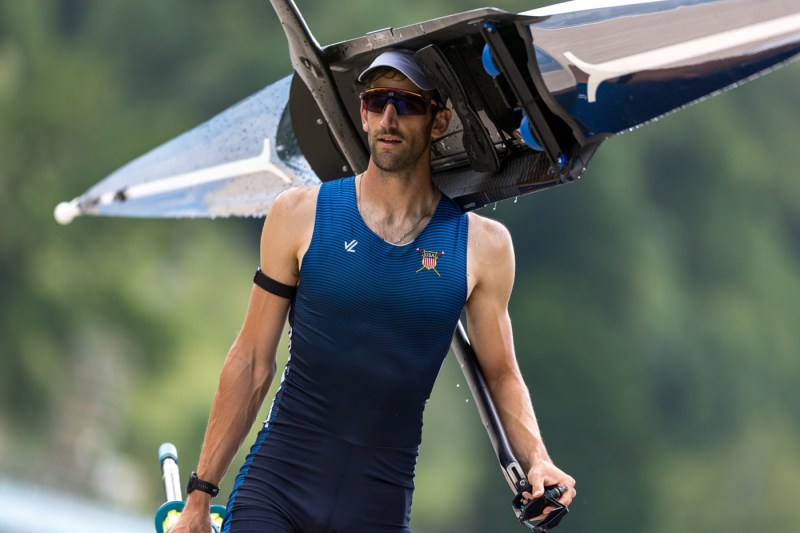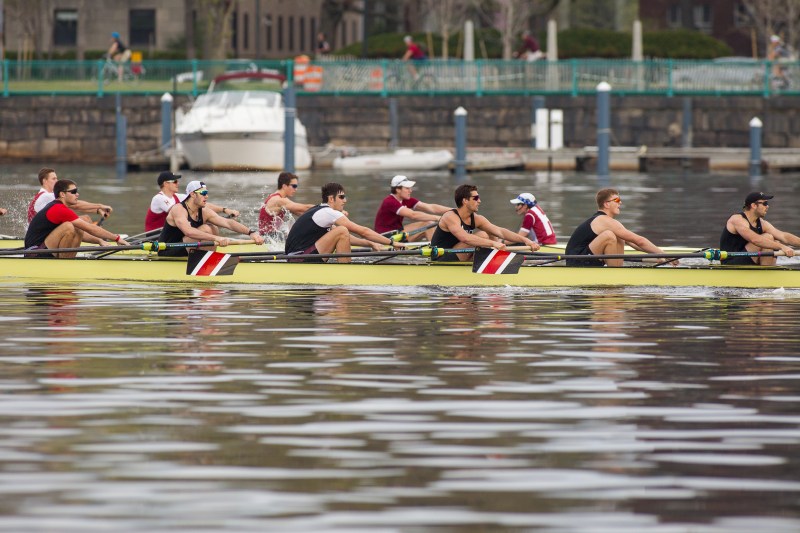Published on
How an underdog rower from Northeastern earned a place in the Paris Olympics
Jacob Plihal graduated in architectural studies from Northeastern in 2018. Later this month, the 6-foot-10 former Huskies captain will make his Olympic debut in the men’s single sculls.

Six years after he departed Northeastern’s nationally ranked men’s rowing program, Jacob Plihal will make his Olympic debut at the upcoming Summer Games in Paris.
“I thought it was possible,” Plihal says of his ascension to the highest level of competition. “But I don’t know if I would have put money on myself.”
The 6-foot-10-inch native of Vashon Island, Washington, will be competing in the men’s single sculls heats on July 27 (the first full day of Olympic competition) at the gorgeous new 24,000-seat rowing venue on Vaires-sur-Marne, a lake east of Paris. He proudly considers himself an underdog.
“I decided to pursue high-performance rowing after graduating,” says Plihal, who was Northeastern’s team captain in 2016 and earned a degree in architectural studies two years later. “I didn’t think I’d be doing it quite this long. I thought I would give myself until the Tokyo Olympics and then get on with a normal career.”
Though he failed to qualify for the Tokyo Games in 2021 (which were delayed one year by the COVID-19 pandemic), Plihal decided to stick with it. “I realized I had more room to grow,” he says.
His optimism was not widely shared. As he prepared for the final Olympic qualifying event in May at Lucerne, Switzerland, Plihal was not rated among the favorites to earn a place in Paris — even as he stunned the field by winning his quarterfinal and semifinal rounds less than four hours apart.


“I kind of surprised myself along the way,” Plihal says. “Being able to win both of those in pretty short order, that was a really big confidence boost.”
Imagine Plihal’s feelings on the day of the qualifying final. He had postponed a career in architecture to pursue this dream that offered no guarantee of fulfillment. He was considered a longshot to row his way to Paris.
He led the final most of the way before finishing second in Lucerne, earning him his place in the Olympics.
Instead of dwelling on a half-dozen years of sacrifices and feeling pressure to make good on them, Plihal had turned the equation upside-down. As he approached the most important race of his life, he found himself strangely at peace. He had never been more relaxed.
“I think waking up every day and having a lofty goal to chase is really powerful,” Plihal says. “I’m trying to strive to be the best version of myself every day. And if I make it or not, I’m still going to have pushed myself further than I probably would have thought was possible.”
Editor’s Picks
‘They took a chance on me’
“I’m living vicariously through him,” Northeastern assistant men’s rowing coach Trevor Appier says.
Appier rowed with Plihal at Northeastern through 2017.
“I myself had an Olympic dream,” says Appier, who rowed competitively for three years after departing Northeastern. “And I sort of hit that crossroads. I decided to step away from it. That was the right decision for me and I think it just gives me another level of pride for him. He deserves everything that he earns. He’s totally done it through his own will and grit, and I think that’s super admirable.”
Plihal was relatively new to the sport when he came to Northeastern. He had been playing baseball in suburban Seattle when he suffered a knee injury that momentarily dislocated his patella. An athletic trainer suggested he take up rowing as part of his rehab.
“I thought it was kind of dumb,” Plihal says of rowing. “I didn’t want to do it. I was really hesitant at first but she kept prodding me. She slowly started to convince me.”
Drawn to Northeastern by the camaraderie of its rowing team, Plihal found himself competing as a freshman in the varsity eight, earning silver in the Eastern Sprints and sixth place at the IRA Championships.
“I probably wouldn’t have been able to make a varsity boat at most of the other top 10 programs across the country,” Plihal admits. “I was not really that good as a freshman. I had a lot of work to do, but I think the coaches saw that I was figuring out some things on the water. They took a chance on me.”
Plihal recalls being pulled aside at practice by Dan Walsh, at that time an assistant coach and Northeastern rowing legend who earned a bronze medal in the 2008 Olympics.
“He would say, ‘You could go pretty far in this, just keep working at it,’” Plihal says of Walsh. “The belief from him and other coaches throughout my time there really set me up well to keep pursuing the dream.”
Appier kept in touch as Plihal continued his career after Northeastern.
“There are some who are blessed and lucky enough that they have the financial support, maybe from themselves or their family, so that the whole money aspect might be less of an issue and they can just go all in on the dream,” Appier says. “And there are others — I would say Jacob falls into this basket — who have to just make it work. Maybe you work remote, or you go to a training facility that allows for part-time work, but the path that Jacob has taken most certainly is not an easy one in any case. And to then also have the necessary requirements to be good enough [competitively] to get into that realm puts you in a very, very elite echelon of athletes. Because there are a lot of athletes who are very talented in college who cannot make that next step.”
When Appier ran into Plihal at a major event this year in Sarasota, Florida, his former teammate said his training was “going pretty well.”
“And then he goes and qualifies for the Olympics,” Appier says, laughing. “It’s very much like him to underplay it.”
‘Nothing to lose’
The U.S. hasn’t medaled in the men’s single sculls since 1956, when John B. Kelly Jr., the older brother of actress Grace Kelly, earned a bronze medal at the Olympics in Melbourne, Australia. Their father, Jack Kelly, was the last American to win a single scull gold medal in 1920.
“It’s been a long time since there’s been a U.S. single sculler at the Olympics,” Appier says. “There’s a lot of pride in the sense that Jacob has stuck to it and been able to do this. It gives a lot of validation to what we’re trying to do at our program — and also inspires the athletes who are graduating that if they want to go for those dreams, hey, look, there’s this guy. He rowed for a small program in Washington as the best guy on his team, he came to Northeastern, was a four-year varsity athlete, did a lot of great things for us. And now he has taken this to the next level.”
Plihal has extended a school tradition: For the 11th time in 14 Summer Games, a Northeastern rower will be competing for an Olympic medal. Plihal is looking forward to seeing his name join the Husky Olympians who are featured at Henderson Boathouse.
“You walk out of the stairwell towards our locker room, it’s right there,” Plihal says. “Looking at that every day, it was inspiring. And to now be a part of that history is pretty meaningful. To have the opportunity to represent Northeastern and the U.S. is pretty cool.”
The belief from him and other coaches throughout my time there really set me up well to keep pursuing the dream.
Jacob Plihal, future Olympic rower, reflecting on his time with Northeastern University’s rowing team
The significance has been affirmed by all of the support Plihal has received from all corners of his life — from the rowing community, from the School of Architecture at Northeastern, from fellow students and former teachers and family members and friends with whom he’d fallen out of touch.
“All the support and people that are invested in the journey along the way — I guess people get inspired from it, too,” Plihal says of his path to the Olympics. “People find value in the story and that’s something I didn’t quite realize at first. And now that it’s been made aware to me, it is pretty cool.”
Someday Plihal envisions himself designing small-scale residential or institutional projects. “Spaces that create a sense of community,” he says. “I think those are really important spaces in everyone’s everyday life. And if I can have a good concept of design and what people want, being able to facilitate high-quality spaces like that, that will be a pretty impactful and rewarding career in architecture.”
The recent success has encouraged him to consider extending his rowing career beyond the Olympics.

It’s as though his efforts for so many years have been flowing toward Paris. With the destination in sight, his daily workouts with supportive colleagues at the Craftsbury Green Racing Project in Vermont have grown more intense than ever.
Appier says all possibilities are available to Plihal.
“The field in the single sculls can be pretty turbulent,” Appier says. “The margins are so thin sometimes and there are a lot of upsets.”
For Plihal the goal will be to maintain the sense of calm that has made this dream come true.
“No one’s going to pick me to be on the podium,” he says. “So I can be a bit of an underdog. Go in and try to turn people’s expectations upside-down. That’s just the best way to approach it.
“Obviously I want to represent well for the nation’s sake, Northeastern’s sake, my sake, for my family, my club. But there’s nothing to lose at this point. So go in there and have fun with it and put the best foot forward and see what we can do.”





